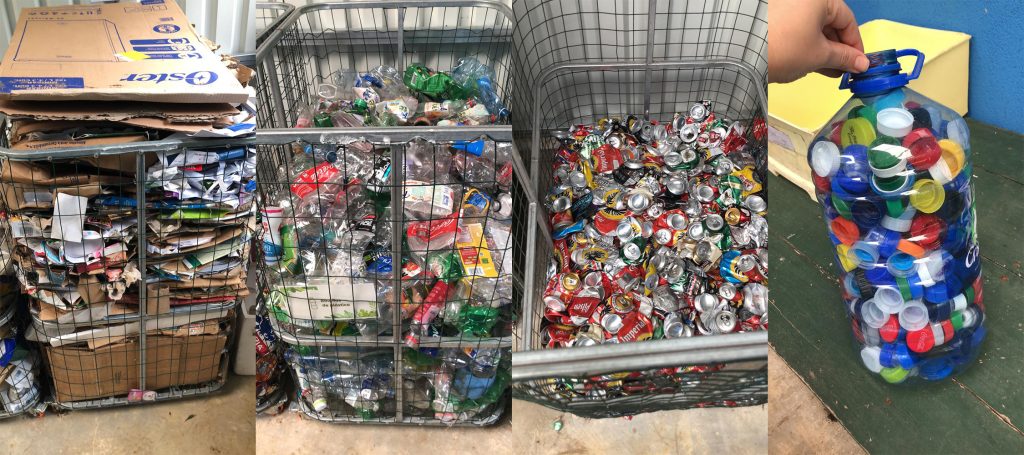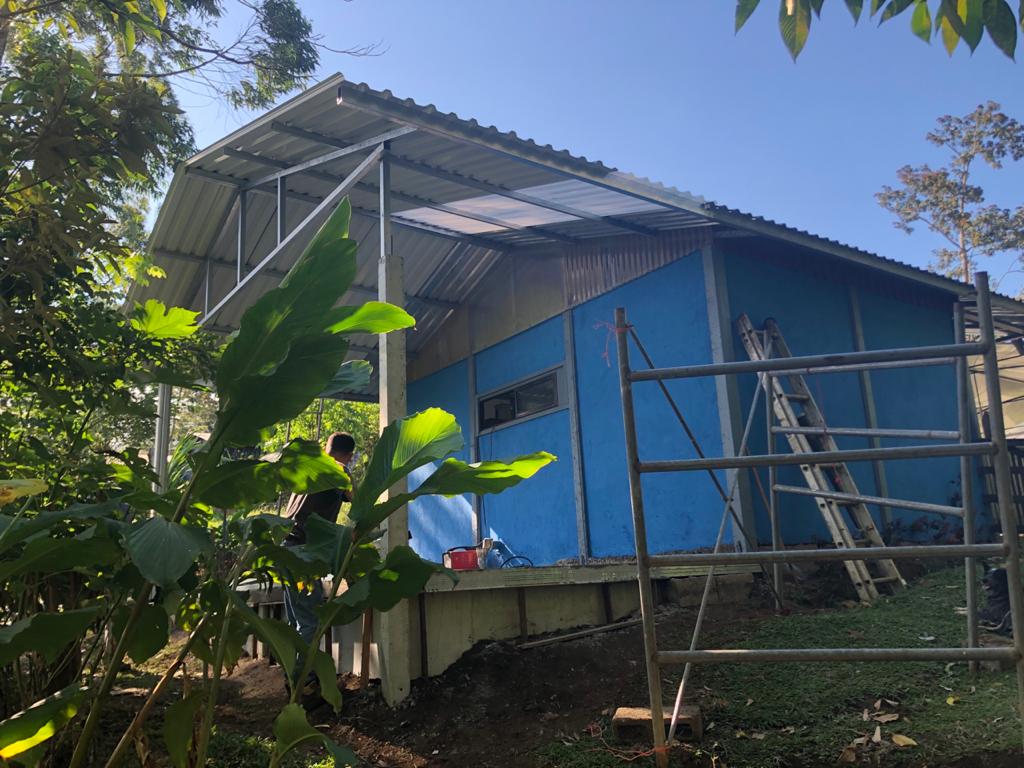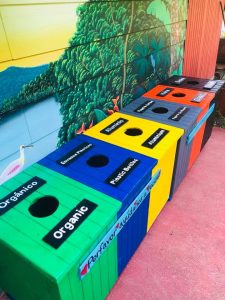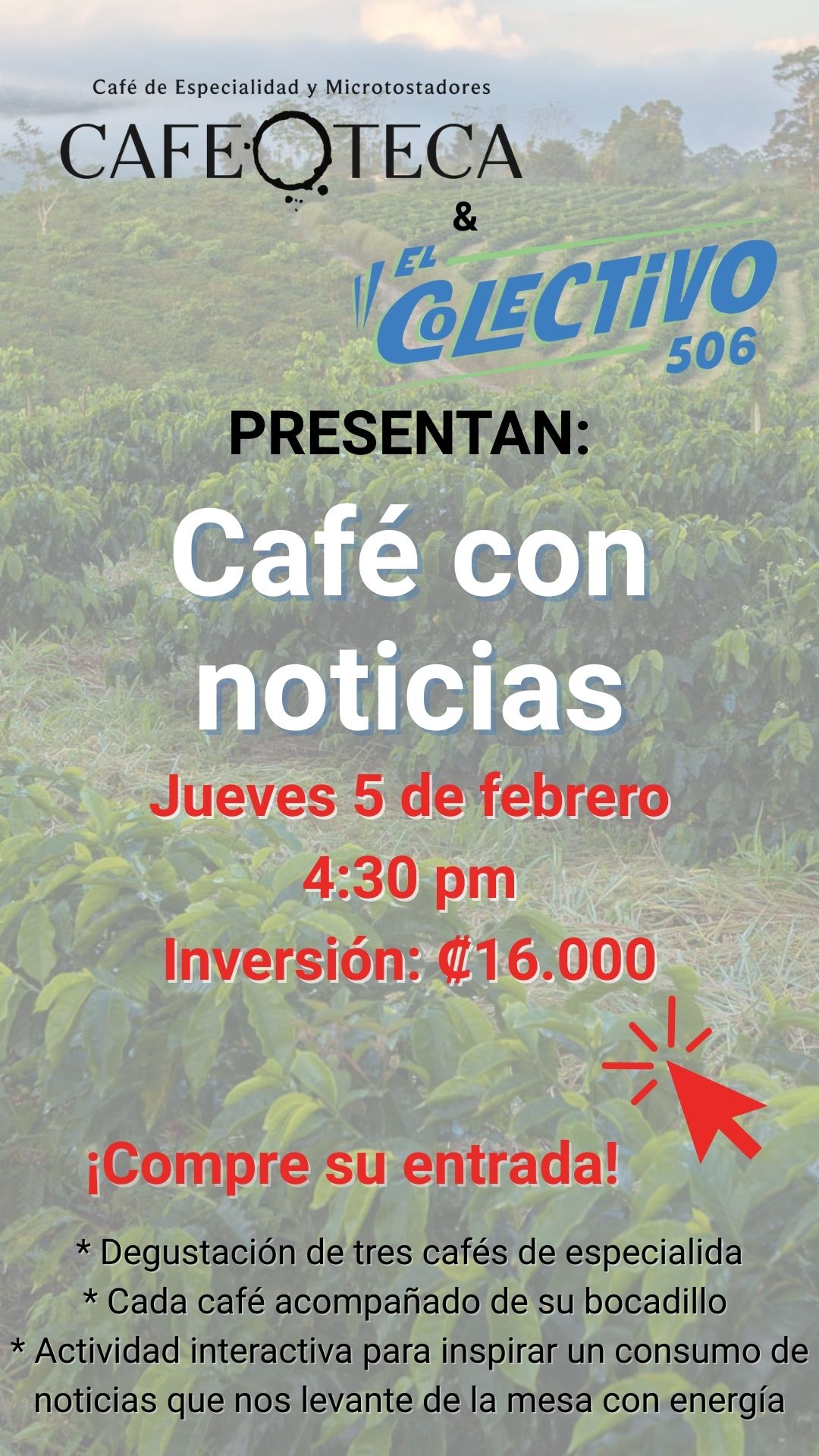When I moved to rural Costa Rica 2007, all the neighbors burned their rubbish. There was no municipal waste collection scheme. People would dump their waste at the crossroad and the dogs would eat it overnight. There were nappies all around. We found an old waste dump on our property: there was glass in there, batteries, old computers, old electronics.
Coming from Australia, this was really mind-boggling for me. Granted, at that time, recycling had just come into play (although today in Australia, the recycling bin is bigger than the landfill bin). I remember the first recycling tubs appearing when I was at university just a few years before. All you could recycle was glass bottles and maybe paper, and then cans.
Taking proactive steps to address the waste and recycling issues I saw around me in Bijagua was integral to my life as an entrepreneur every step of the way. First, we took matters in our hands and built a little place where people could put their waste. It had a little door on it to stop dogs and coyotes and agoutis from eating stuff out of it. Eventually, our road was able to be improved—this went hand-in-hand with being on the road committee—so that the waste truck was able to go up there. Then the school bus. Then a truck to pick up milk. It goes to show that, with waste management and just about anything else, the whole process follows the overall development of available services in a rural community.

When Casitas Tenorio started as a business between 2007 and 2008, I always separated waste, even though there wasn’t any recycling available. When tourists left behind glass bottles, I just couldn’t bring myself to throw them in the rubbish. I would keep them. We had a big stockpile for many years, and people in the community could use them for art and other projects.
We always composted, then and now. We encourage our guests to feed our chickens, and also feed our dogs, with leftover pizza or steak, doing anything we can to reduce the waste we send to the landfill. I used to make eco bricks and then use those bottles for projects in the garden. I’ve always used the garden as a place for upcycled things that we don’t use, like washing machines or tires, trying to give things a new life.
In 2019, I received a grant from the Fund for Green Businesses in Biological Corridors (Fondo de Negocios Verdes en Corredores Biológicos), and was able to take things to the next level.
Creating a recycling center for the community.
We used the donation from the Green Businesses Fund to build the recycling center at the back of our laundry area. My idea was to have a place where we could sort out our own recycling and then take it to Liberia, about an hour away, where it could be delivered to an official recycling facility. To track our impact, we immediately started working with ecoins to monitor how much of each type of recycling we delivered to the facility. I’ve never actually used the actual “ecoins”—points users of the app can earn, and then use to get discounts on purchases—but it helps us see how much stuff we’ve kept from going into a landfill, being buried, or being incinerated.
The recycling center, or Centro de Acopio, has also become a resource for members of our community. Bijagua now has a recycling municipal truck that picks up materials from the community, but our neighbors can also bring their recyclable waste to us. Once every three or four months, I pay for a truck to take it to the authorized recycling center in Liberia. The material gets weighed, allowing us to track how much waste we—guests, staff and even members of the community—have sent for recycling.

Even the building that houses the recycling center sustainable. There’s no electricity in there: it uses natural light. The water is recycled. With the exhaust from the dryer in our laundry area, we keep the recycling center dry and reduce humidity.
Our recycling center has kept a lot of waste out of the landfill; we’ve earned 271,082 ecoins so far. It’s educated our local community. It’s allowed our employees to make changes. And yes, we have got everything weighed and measured, which allows us to say how many things we have recycled.
It’s allowed our guests to be positive changemakers, which we have made a huge priority.

Taking an extra step: challenging our travelers
Tourism can have a negative impact on local communities and also on climate change. You get on a plane and spend thousands of dollars on emissions. You go and exploit an area—whether that’s exploitation of local people, or exploitation of the environment—and then you go home. However, I have realized that this can change.
There are plenty of ways for good sustainable tourism businesses to find community and recognition, like becoming a Certified B Corporation, which we achieved in 2022. If a major step like that is too much, there are many smaller ways that businesses can give back and drive change within a community.
I wanted our guests to be able to make change. I decided to challenge them, and also my staff, to make changes in our lifestyles that have a positive impact on the environment.
At Casitas Tenorio, we give opportunities for our guests to act in a sustainable way. We challenge them to think, “Hey, I can make a choice here.” We give our guests the opportunity to recycle, and also to make other positive choices when they stay with us. They can say, “I don’t want my towels changed. You don’t need to change my sheets. I will recycle the things that I use in my room. I will be an active participant in the trip.”

We placed colored recycling bins next to our reception so that people could come down from their rooms and actually sort their recyclable waste. Then our staff take those to our recycling center, where it can be kept dry and clean until our next delivery to LIberia. And because the recycling we hand over is weighed and tracked, we can share our impact with guests.
Guests have a bucket in each room for organic waste that we feed to our chickens. There’s also information in the room about switching off lights, and not leaving on the tap when you brush your teeth—and not using bottled water, because we’ve got the best water in the world!
We are giving our travelers the choice to be active and positive participants in their own trip. By doing so, we also hope that we are showing them specific actions that they can take when they go home, to continue their positive impact.
Why, as a rural tourism business, get involved in recycling?
Why not?
It’s our obligation—and mine. It’s my obligation to the world, and also to the industry, that I work in to make sure that we operate in the most sustainable way possible. Environmentally. Socially. Economically.
After all, we’ve only got one world. We must look after what we have. We’ve got to reduce our impact, reduce our footprint, reduce the negative impacts of climate change.
For me, recycling is part of a whole spectrum of lifestyle change. Giving my clients, employees, and community members the opportunity to make a change by separating their waste is a really wonderful, practical, and tangible way to see that in practice.
In the end, the Centro de Acopio at Casitas Tenorio is not just a recycling center. It’s a place for shared learning. Through the project, we’ve learned about how we can take better care of the planet. And as we grow as a business in the community, we grow together, too.
It’s really overwhelming to take a stand, to be able to make change. But if we can do it, why don’t we? In the process, we might just inspire other businesses to follow.
For El Colectivo 506, is an honor to have Casitas Tenorio as one of the sponsors of our April 2024 edition, “Recycling closes the circle.” For more information, contact them through their website, or through theircontact page find them in social media as @CasitasTenorio.







